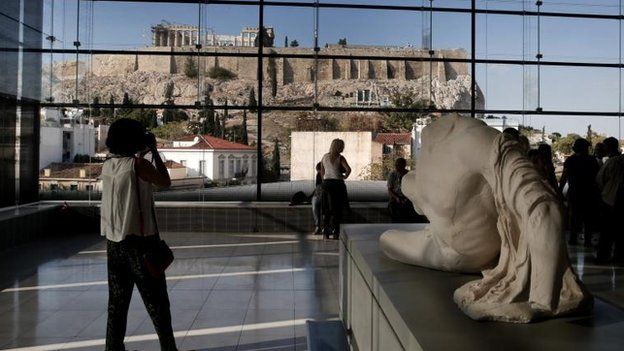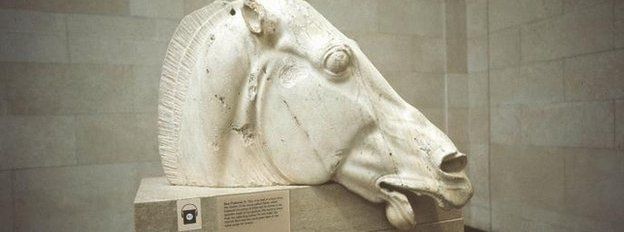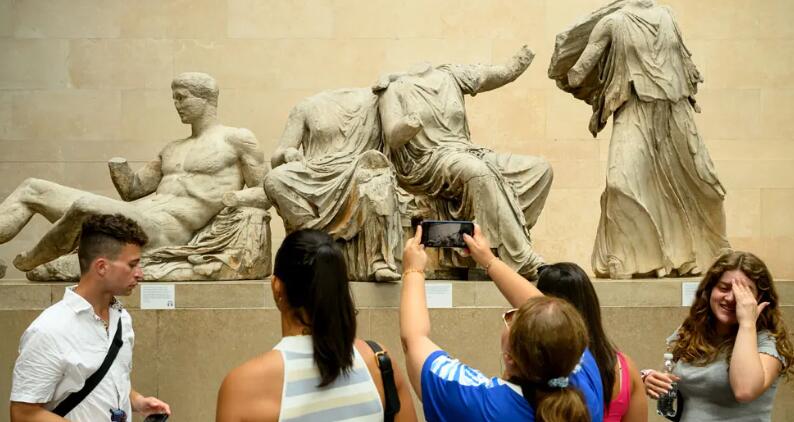Rishi Sunak cancelled his meeting with the Greek prime minister after it was felt a promise not to publicly discuss the Parthenon Sculptures was broken, Downing Street said.
Kyriakos Mitsotakis told the BBC on Sunday he wanted the artefacts – also known as the Elgin Marbles – returned from the British Museum to Greece.
The meeting was scrapped on Monday at late notice.
A Greek government source denied assurances were given to the UK.
They said discussions preparing for Tuesday’s meeting with the UK PM had been smooth until late afternoon on Monday – long after Mr Mitsotakis’s BBC interview with Laura Kuenssberg on Sunday.
In the interview, Greece’s leader said having some of the treasures in London and others in Athens was like cutting the Mona Lisa in half.
But the PM’s official spokesman said on Tuesday that when the meeting was requested “the Greek government provided reassurances that they would not use the visit as a public platform to relitigate long-settled matters relating to the ownership of the Parthenon Sculptures” – arguing those assurances were then “not adhered to”.
Thespokesman told reporters Mr Sunak had decided it would “not be productive” to hold the meeting.
Labour has described the row as “petty” and “small-minded”.
The sculptures are a collection of ancient Greek treasures from the Parthenon in Athens which were taken and brought to the UK by British diplomat Lord Elgin in the early 19th Century.
They have been in the British Museum since 1832, aside from a stint in Aldwych Tube station during World War Two to prevent damage and one marble being loaned to a Russian museum in 2014.
Both Greece and the UK have long-standing positions on the sculptures, but diplomatic talks were expected to focus on other topics.
Transport Secretary Mark Harper told BBC Breakfast on Tuesday it was a “matter of regret” that no meeting would take place between the two countries after Mr Mitsotakis declined a secondary offer to meet Deputy Prime Minister Oliver Dowden instead.
Asked whether the government’s treatment of the Greek leader was rude, Mr Harper said the Greeks had been offered a senior-level meeting but were entitled to take their own view.
Greek minister Adonis Georgiadis told BBC Radio 4’s World at One programme the row was a “bad day” for British-Greek relations and that Mr Sunak’s decision had been a “mistake”.
Stressing his “huge respect” for the British people and the two countries’ friendship, the minister of labour and social insurance said: “What [the Greek PM] mentioned in his interview is not just his own opinion, it is the single one opinion of 11 million Greek people.”
Professor Irene Stamatoudi, a former member of the advisory committee for the Greek minister of culture, said the row “makes Rishi Sunak look no better than Lord Elgin” – and accused that diplomat of smuggling artefacts “to decorate his country house in Scotland”.
She told Today it was “not possible” for the Greek PM not to respond to questions about the Parthenon Sculptures.
Mr Sunak is keen to be seen as a defender of the marbles’ place in London. A senior Conservative source said: “Our position is clear – the Elgin Marbles are part of the permanent collection of the British Museum and belong here.”
BBC diplomatic correspondent James Landale said the incident runs counter to the government’s strategic aims, with an official foreign policy review from this year saying the UK’s “ambition is to build even stronger relationships with our European allies” after Brexit.
Greek Prime Minister Kyriakos Mitsotakis likens having some Elgin Marbles in the UK to ‘cutting Mona Lisa in half’
On Monday evening, Mr Mitsotakis told reporters he was “deeply disappointed by the abrupt cancellation” of the talks.
In his interview with Laura Kuenssberg the day before, he had called for the sculptures to be returned, saying they were “essentially stolen”. He called for a partnership with the British Museum so people could “appreciate” the works “in their original setting”.
Mr Mitsotakis met Labour leader Sir Keir Starmer on Monday and will return to Greece later after other scheduled meetings.
On Tuesday morning, Greek government spokesperson Pavlos Marinakis told SKAI TV that “Britain’s attitude shows no respect for the prime minister and our country”.
He added that although cancelling a meeting was not “common”, the Greek government did not want “to escalate the issue with a country with which we have good relations”.
There is an ongoing wider debate around the place of museums and their collections in a post-colonial world, with Mr Sunak seemingly positioning himself decisively on one side of that argument.

Lord Vaizey, who chairs the advisory board of the Parthenon Project dedicated to returning the Elgin Marbles to Greece, told the Today programme it was “odd” for the PM to cancel the meeting.
The ex-culture minister said: “It is tied up to a certain extent in the traditional culture wars, where anyone who dares to say that British history wasn’t perfect is somehow unpatriotic.
“The trouble with that is that, from what I can gather, every opinion poll that surveys the British public says that they do think that the sculptures should be returned.”
Thangam Debbonaire, Labour’s shadow culture secretary, said it was “petty” and “small-minded” to cancel the meeting, and called Mr Sunak “reckless”.
“To have decided to create division where none needed to be seems to me to be not just reckless but actually potentially really damaging to our international reputation,” she added.

Labour is also distancing itself from reports in a Greek newspaper suggesting it was open to “a legal formula” for the return of the sculptures to Greece.
Instead, the party says its position is that if the British Museum and the Greek government came to a loan agreement, a Labour government would not stand in the way.
A spokesperson for the UK government said there were “no plans” to change the 1963 British Museum Act – which prohibits the removal of objects from the institution’s collection.
But a loan does not require a change in the law and so could happen irrespective of any PM’s position.
Unesco, a UN agency which was established to promote world peace and security through cooperation on arts and culture, has told the BBC it “stands ready” to broker an agreement between the UK and Greece, “if they express the desire for such support.



